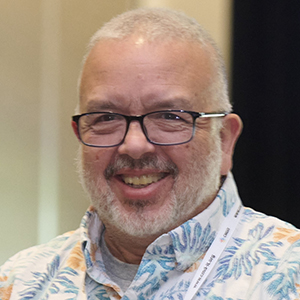The political conversation has coopted some vocabulary and made it difficult to advance conversations, research and explorations in some hotly contested areas. In this talk Dr. Pérez-Quiñones will present an existing definition of equity in health and draw parallels into HCI design and equitable grading practices. His work on the two seemingly unrelated domains has as a foundation a concern for closing the disparities that exist in society through technological interventions.

Dr. Manuel A. Pérez-Quiñones,
University of North Carolina at Charlotte
With examples of a study of bilinguals, Dr. Pérez-Quiñones shows how technology design heavily influenced by the ideology of monolingualism creates additional burdens for bilingual users. Armed with data from focus groups as well as personal experiences, he makes the argument that technology is forcing bilingual users to pick a language. This has implications for education, open communications across language communities, and could create hidden chasms in society. The second set of examples come from early experiences using equitable grading practices. A survey of faculty shows the confusion of the terms equity and equality. Students’ reaction to some equitable practices show that much work is needed if we are to offer an equitable environment for students in college. It is important that we have honest and clear conversations on these issues. Researchers need to avoid being drawn into the heated debates that distract us from continuing to study these topics as a way to address the needs in society.
Dr. Manuel A. Pérez-Quiñones is a Professor in the Department of Software and Information Systems at the University of North Carolina at Charlotte. His research interests include diversity issues in computing, CS education, and human-computer interaction. He is a member on the Committee on Women in Science, Engineering and Medicine at the National Academies, an elected member of the Board of Director for Computing Research Association and a former Program Officer at the National Science Foundation. He has published over 140 peer-reviewed articles and has received numerous recognitions for this work in diversity, equity and inclusion, including ACM SIGCSE Distinguished Service to Computing Education (2025); NSF Director’s Award for Achievement in Diversity, Equity and Inclusion (2024); ACM Distinguished Member status (2019); the CRA A. Nico Habermann award (2018); and the Richard A. Tapia Achievement Award (2017). He is originally from San Juan, Puerto Rico.
Photo and abstract pdf attached.
* The ideas presented in this talk do not reflect the opinion or policies of the University of North Carolina at Charlotte.